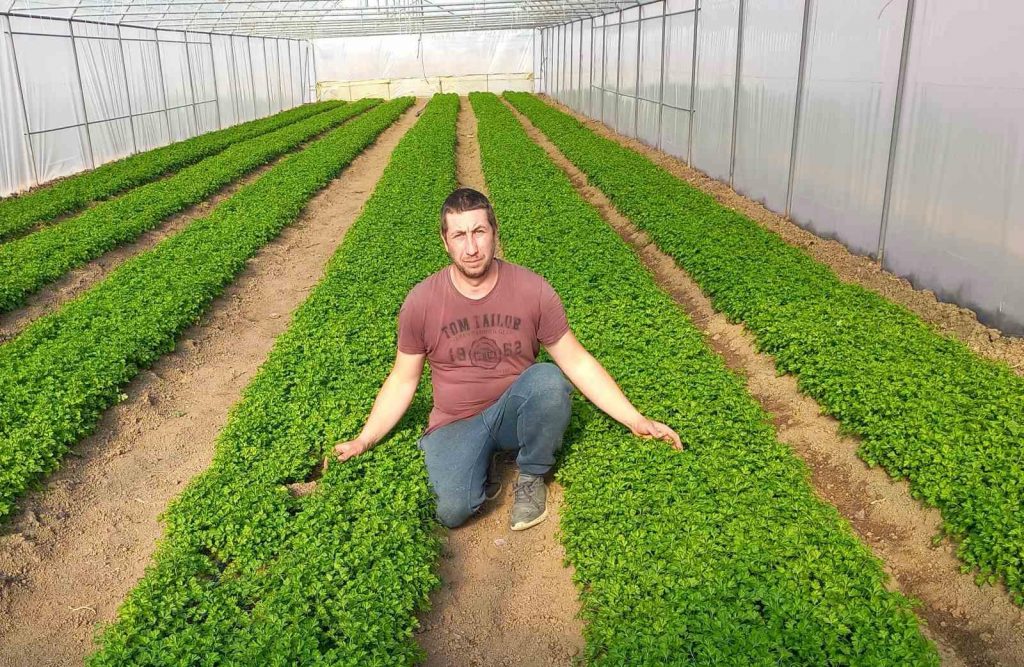Despite what pesticide corporations would like us – citizens, farmers, politicians – to believe, viable alternatives to toxic chemicals do exist and are already happening in farming across Europe. Many farms in conventional agriculture have managed to substantially reduce pesticide use using Integrated Pest Management (IPM) and agroecological practices, paving the way for a healthier, fairer, more caring and nature-friendly future for agriculture.
Via Pontica, a Bulgarian organisation dedicated to nature protection, spoke to Emil Stoev, a greenhouse farmer who has embraced agroecological practices to improve soil health and grow high-quality, pesticide-free vegetables. By focusing on microbiology, organic fertilizers, and IPM methods, Emil has transformed his approach to farming. Read his interview to learn about the benefits, challenges and lessons learned along his journey.
- Can you tell us more about your farm and what motivated you to adopt good agroecological practices?

My name is Emil Stoev and I am 36 years old. My farm covers an area of 5 acres of greenhouse space where I grow Bulgarian pink tomatoes during the summer season and parsley for fresh consumption during the winter. I switched to more sustainable agriculture with the main goal of keeping my soil alive and producing cleaner vegetables.
- What were the main challenges you faced when transitioning to good agroecological practices, and how did you overcome them?
The most unusual thing for me was realizing that soil is a living organism, and from there, I had to start working on its microbiology. This required a lot of reading and understanding how it actually works. I began adding a lot of organic material to the soil, and plant protection was entirely based on bio-products, which turned out to be more effective and sustainable than conventional methods.
- Which good agroecological practices did you implement on your farm, and how did they affect your agricultural activities?
I started working with many microbiological and organic fertilizers made from plant oils, seaweed extracts, amino acids, and other products that prevent nutritional deficiencies in plants. Soon, all my efforts began to pay off with yields I thought were impossible to achieve.
- What was the effect on yields and the quality of production after implementing these methods?
The effect was surprisingly good—fewer diseases (or none at all), better taste quality, improved product quality, and higher yields.
Agroecology offers an alternative to pesticide-heavy intensive agriculture. Agroecology is a system of food production based on ecological, social and political principles that value healthy and diverse agroecosystems, minimizing external inputs, secure livelihoods for producers, and nutritious food accessible to all.
Working with nature (rather than attempting to constrain it) is one of the basic principles of agroecology. Agroecological practices include crop diversification, planting crops that are adapted to the local environment, crop rotation, using natural preparations, and many other methods to promote beneficial organisms.
Many studies show that switching to diversified agricultural production can help to regulate crop pests while drastically reducing or eliminating pesticides, all without compromising yields.
- How did the transition to good agroecological practices affect the environment and biodiversity in your area?
There was an increase in beneficial insects, which greatly helped with pollination.
- What changes did you notice in your farm’s expenses and profits after applying these practices?
Naturally, the costs increased slightly because bio-fertilizers and products are a bit more expensive. However, this is offset by having fewer losses in production and better quality, which in turn leads to higher demand and profits.
- How did clients and the market react to your products produced with good agroecological practices?
Clients are satisfied with consuming clean and very tasty vegetables.
- What motivates you to continue using and developing good agroecological practices on your farm?
The motivation is entirely focused on keeping the soil alive, producing clean produce, and the fact that these methods are much more sustainable than conventional ones.
- What advice would you give to other farmers considering transitioning to good agroecological practices?
I would tell my colleagues to read and inform themselves a lot because this is the future. There will be mistakes and failures, but you have to believe in what you are doing.
- What are your future plans for developing and expanding good agroecological practices in your agricultural activities?
My plans are to continue in the same direction and reach the final consumer who truly appreciates the quality of clean food.








